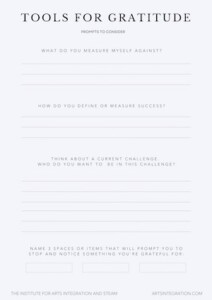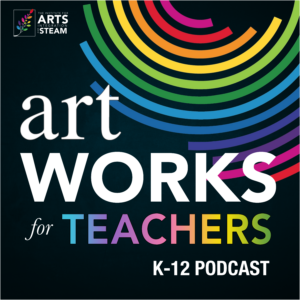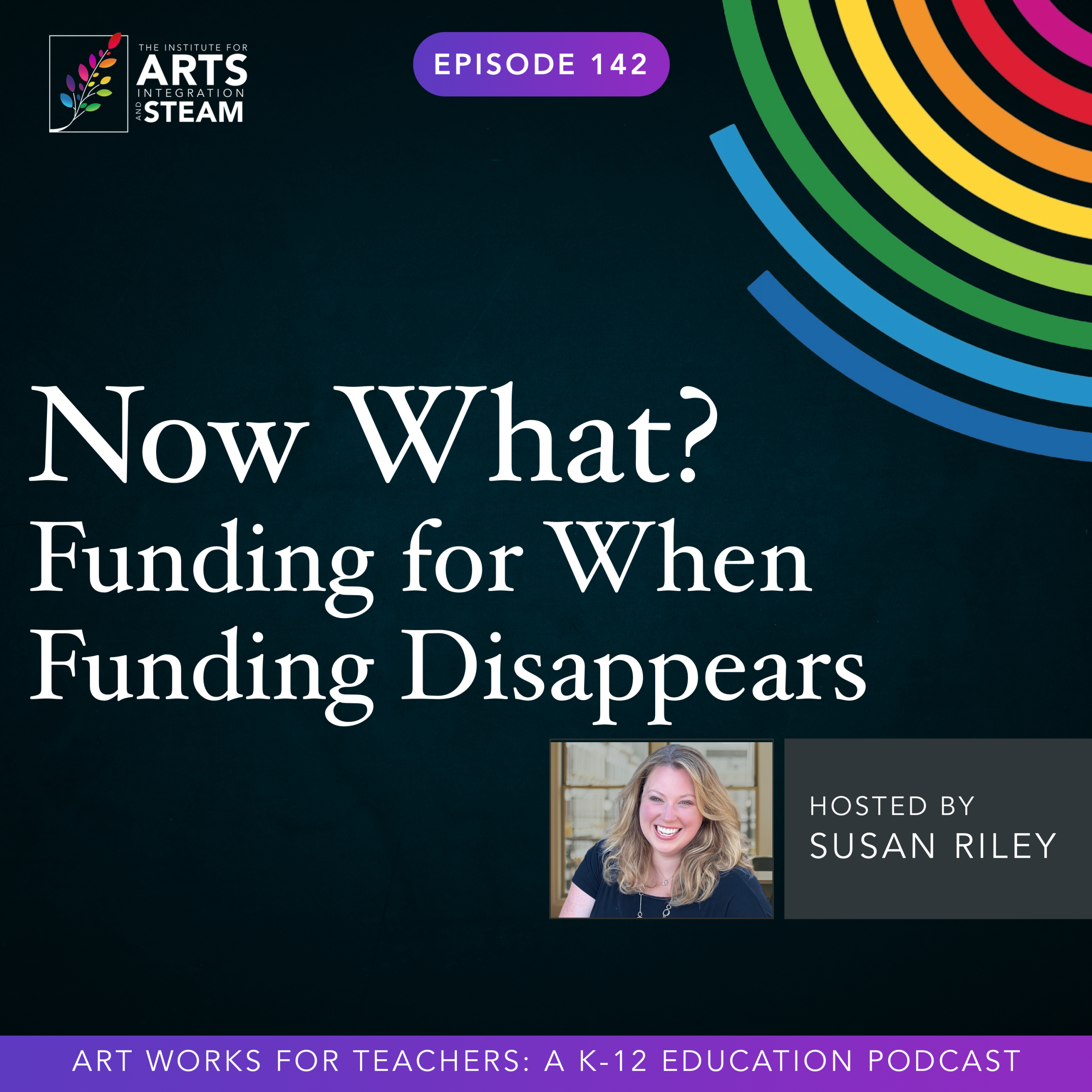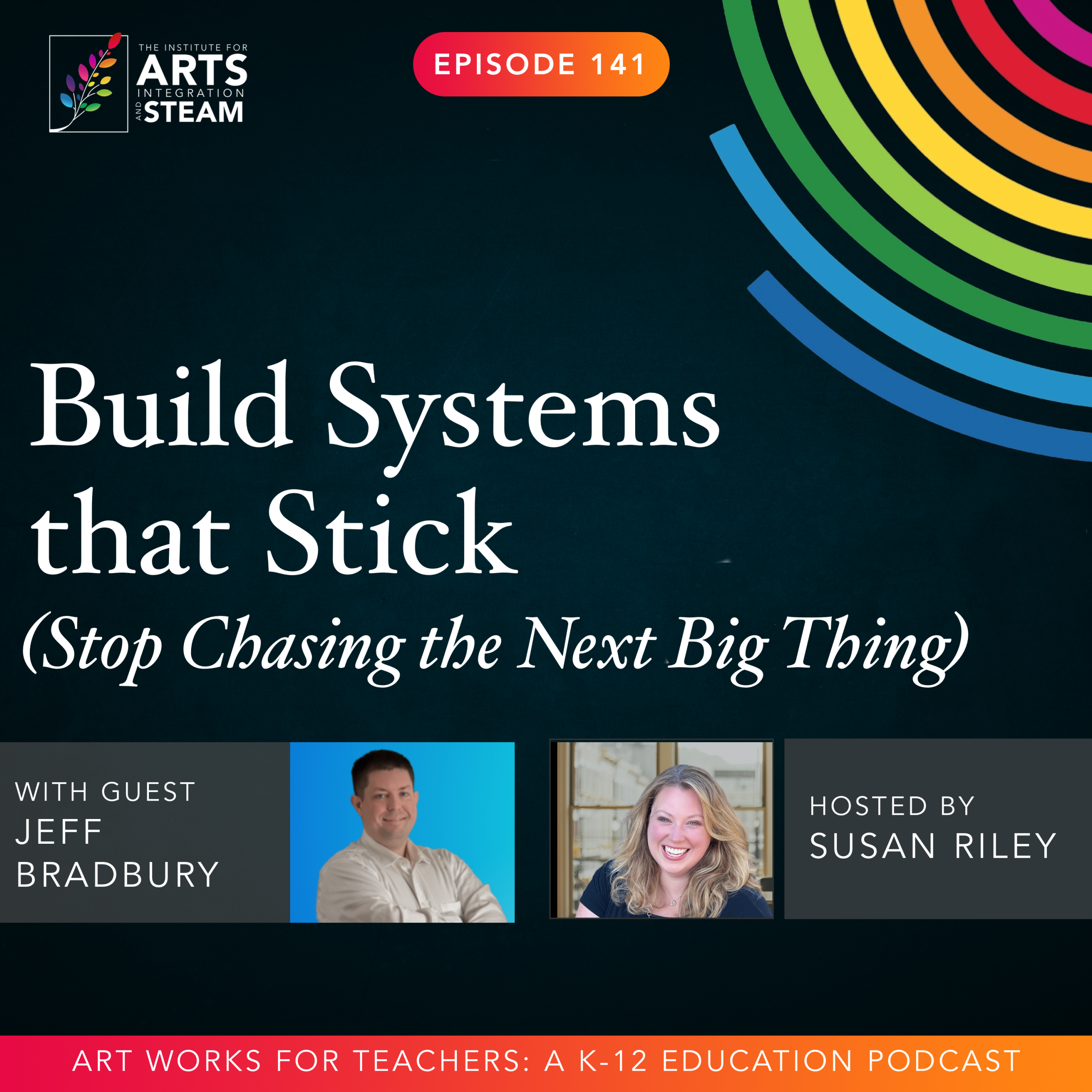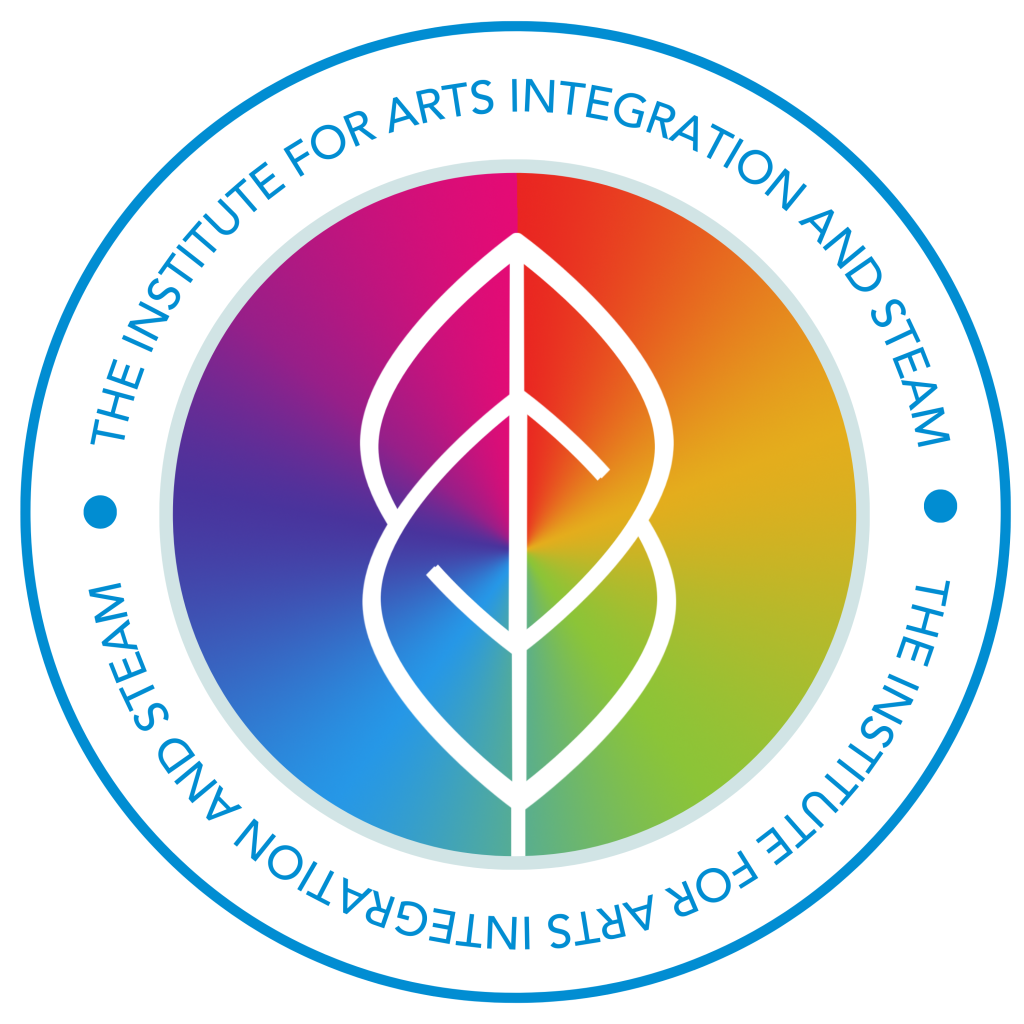ART WORKS FOR TEACHERS PODCAST | EPISODE 011 | 16:26 MIN
A New Way to Practice Gratitude on Thanksgiving
Tired of the same old “I’m grateful for…” routine as you sit around the Thanksgiving table? In this episode, we’re exploring the science of gratitude and how small acts can make a bigger difference.
Enjoy this free download of the Tools for Gratitude resource.
Susan Riley: Hey there, friend. Happy Thanksgiving. It’s Susan Riley here from the ArtWORKS for Teachers Podcast, and it is Thanksgiving Day here in the United States. And so this is a special episode now. I’m not gonna keep you from your turkey or your parades, or anything like that, but I did wanna take a minute and talk about gratitude since that is the, the, you know, name of the day today for Thanksgiving.
I’ve been thinking about gratitude a lot, and of course I’m grateful for you, for you as a listener for you to be a part of our community and for your time because that is, as I often say, the one resource that we can never get back. And so I just wanna share with you that I am massively grateful for you as a person.
But I also wanna talk about this idea of gratitude because I think we get to this day where we gather around a table typically with friends or family and we share what we’re grateful for, right? And, and we know that gratitude is a wonderful practice, but I don’t know about you, but I know that when I sit around that table and you know, my mom asks everybody to share what they’re grateful for, sometimes I get stuck
.And it’s not that I don’t practice gratitude in my life daily. But when we’re sitting around a table, sometimes when we say something that we’re grateful for, it can feel trite. It can feel like something that we have to do, and so therefore it’s not as meaningful. And so it spurred me to be thinking about this, and I wanted to share with you some of the thoughts that I’ve been having around gratitude just on this wonderful day together.
One of the things about gratitude that I’ve been studying is that scientifically it has been proven that people who practice gratitude daily, actually rewire their brains and they are happier people by far. On the measurement scales that scientists use, people who practice gratitude on a daily basis are happier and their brains are wired to look for more gratitude.
So once you start to practice, it kind of snowballs. And I’ve always thought, why wouldn’t anybody want that? Right? Why wouldn’t we? More gratitude and a happier life, and for our brains to be wired for positive gratitude, energy, right? But the trick is that you have to practice gratitude in a way that doesn’t feel like you’re putting on a show, for lack of a better word. So that’s tricky because oftentimes I don’t know about you, but when I look at, at gratitude journals or meditations or affirmations I see sentences which sound really good and I wanna share them, and I try them on like a hat, you know? It just doesn’t feel right. And so I get a little stuck and I’m getting a little discouraged, honestly.
Because I have a gratitude journal and I sit and I write things that I am grateful for. You know, I’m grateful for my daughter. I’m grateful for my husband. I’m grateful to live where we live and to be able to do what I love for a living. But especially during Covid, I noticed that somehow, even though I was grateful for all of these things, it didn’t seem like it was enough.
How do you not have enough gratitude? So, I was kind of researching this dilemma a little bit, and if this is resonating for you, I don’t think I’m alone. I think that many times people actually start a gratitude practice and stop it because it doesn’t feel right. It feels like we’re, we’re not actually resonating with ourselves.
So I researched this a little bit and I came across the book The Gap and the Gain by Benjamin Hardy. I would highly recommend it, especially if you are a type A learner like I am because they talk about this one key idea. That the gap means that your life is determined by someone or something external, and the gain means that you’re living a self-determined life.
This is a big shift as I started to read in this book, and they set up this premise very early in the book so that you have time to kind of wrestle with it for a while. Because what this means is that many of us spend our time in the, what they call the gap, in looking for external reasons to satisfy us, which is why that gratitude practice of writing down things that we’re grateful for outside, external things doesn’t necessarily fulfill us.
Because when we are constantly seeking from outside sources, either approval or attention or to just kind of be connected externally, if that’s all we’re doing, if that’s all that we’re spending time doing we’re not filling ourselves and we’re not being honest with our and we know it. So the gain means that we are focused on our self-determined life, that we get to choose the life we have, what we will and will not accept.
How we approach a situation if something is difficult, how we acknowledge that and how we choose to then move forward with it. And it is so empowering to be in that space. And so the author then goes into how do you practice gratitude from the gain, from the self-determined life, from yourself?
And so he starts to ask some questions and I thought these would be helpful to share because they were certainly helpful for me. Things like, what are the reference points that you measure yourself against for many teachers. I know this habit of going through Instagram and seeing all of these perfect classrooms and these perfect teachers are the things that many of us are measuring ourselves against, and it can be toxic.
One of my coaches calls that compare-schlager. You just have a hangover when you’re done with it. So are you measuring yourself against external? Forces that we see, or internal measurements of, of success, what does that look like for us? How do you define or measure success for yourself? How do you define what you’re grateful for?
What are the things internally, which means that you gotta be grateful for yourself and for your own ability to discern for yourself the best way forward? I think as educators, we lose this a lot because we give and give and give. We are a giving people. We give to our students, we give to our administrators, we give to the parents, we give to the community, and we oftentimes do not allow for ourselves to be given too, to receive, right. It feels weird to receive because we’re constantly giving. So I think for a gratitude practice, something that helped me, particularly from this gap and gain idea was to consider what am I grateful for in my own, for my own self that I have been able to accomplish or to overcome.
Another way to put this that they have in the book that I think is fantastic is this question of what do I believe now that I did not believe three months ago? And so that can be something that we’ve learned about ourselves and when we shift this mindset then things don’t become so trite. I think one of the practices for gratitude, particularly on a specific day like today, is, and the reason that we feel like it’s trite is because even though we practice gratitude in the things we are grateful for, there are hard things that are still surrounding us. Many of us have had to make different difficult choices around our jobs, our health, our mental wellbeing, our families in the last several years, these are hard, difficult things and without, without having a gratitude practice within.
And just being grateful for the things externally. Then those hard things, it feels like those hard things are just being shoved aside so that we can be grateful and as if we have enough. Right. I would like to, to just invite all of us, and myself included, I have to remind myself to do this to consider a practice where, You’re thinking about all of the ways that you have chosen to move through the hard things.
And to be grateful for the choices that you have made, whether they have turned out the way you want it or not. I think being grateful for the internal voice that you have listened to, to make the choice that whatever choices that we have made, good and bad for good or bad reasons this year. Is a really powerful exercise.
I know for me in the last 18 months there I’ve had to deal with some very difficult things that I never thought that I would have to, to deal with things that were thrown my way that I never saw coming. And I made some good choices and I made some bad choices. And, what I wanna to tell myself though, on this day for gratitude, is that I’m grateful for the choices that I’ve made because they’ve led me here and it has allowed me to look at them and learn from them so that I can make even better choices for myself moving forward.
I think that’s a gratitude practice we can all get behind. Another thing that I have had to work around with gratitude practices is, and not having it feel woo woo or extraneous, is considering small steps, small ways that we can be grateful throughout the day so that it’s not just sitting down with my journal and writing it out, but to actually be grateful throughout the.
This is how we rewire our brains. This is what science tells us, actually makes the difference. So I was, I went on a journey to figure out, okay, how do we do that? Right? I’m a very tactical person, and so I wanted to know the specifics around how to do that. It’s actually really hard to find people who will be honest with you around that.
I just did an an episode though around mindfulness. With SarahJane Herboldt, and she kind of gave me an idea that just clicked, and I hope that it, it resonates for you as well. This idea of small ways that we can practice gratitude through like every having small moments that you decide in that small moment.
I’m gonna pause for just like 10 seconds to notice something around me that I’m grateful. And this is where it clicked for me because in the science, in all of the science that I’ve read, gratitude is not just saying thank you. It’s noticing. It is an act of noticing things around us for which we are grateful.
So for SarahJane, when she kind of called this out in, in that episode, she was talking about when you walk through a door that any kind of door you could walk through, a bathroom door, your classroom door, the door to the school, the door to your home. Anytime you’re crossing a threshold, you just pause for a brief second and check in with yourself.
How am I feeling? And for her, that was a measurement of mindfulness for me. When I practice that, I pause for a second to just notice the things around me and notice something, one thing, anything that it could be that I’m grateful for. So when I walk in and the door in my house and I look around for just that second, and I notice that there are no dog toys right in front of me that I’m gonna trip over, I’m gonna be grateful for that because there have been days where I’ve tripped over them and it’s not been pretty, right.
Small things that seem trivial, but yet allow us to practice the act of gratitude in small ways. This is what changes our brain. And so I’ve put that practice into place. And believe it or not, it has, it has been very helpful. So noticing a, a what she calls a trigger point, a way to just, if you’re gonna cross a doorway or every time you turn on your computer or you, or you flip on your phone, you take a… Anytime you do that, to just look around and notice something that you’re grateful for. This is the practice that they’re talking about, not sitting down and having to journal all of the things all of the time, although that can be helpful. Small ways. And I think in today’s busy society where we’re all running around constantly having something like that, a tactical way that we can practice gratitude on the daily is more helpful than we might realize.
So those are my tips today as we head into Thanksgiving. I told you this was gonna be a shorter episode but I just, I just wanted to say thank you for being a part of our community, for being willing and open to explore creativity both in the classroom and for yourself. And I’m really looking forward to the year ahead.
I hope you are as well. So with that in mind, I hope you have a wonderful day. If you’re practicing Thanksgiving, I hope you have a time with family, friends or doing something that you love. And if you’re not practicing Thanksgiving today, I hope that you are at least centered or surrounded by something that you’re grateful.
All right, everyone. Have a wonderful day.
The Gap and the Gain book – https://gapandgainbook.com/

